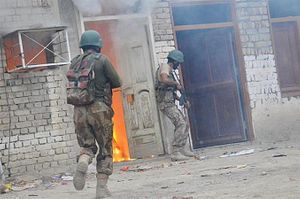India is expected to participate as the “Guest of Honor” in the 46th session of the Council of Foreign Ministers of the Organization of Islamic Cooperation (OIC), which is being held in Abu Dhabi later this week. This is the first time that India has been invited to any OIC meeting as a guest of honor.
The group’s main objective remains safeguarding and protecting the “interests of the Muslim world in the spirit of promoting international peace and harmony among various people of the world.” A majority of the OIC member states are countries that have a majority Muslim population. However, some states such as Russia and Thailand that have a significant minority Muslim population are also present at the forum as observer states. While India is a country with one of the largest Muslim populations in the world, so far, New Delhi has never been able to join the OIC in any capacity. The news of India joining OIC as the guest of honor is significant in a number of ways, particularly for New Delhi’s relationship with Islamabad.
The OIC’s invitation to India coincides with the recent visit of the Saudi Crown Prince, Mohammad Bin Salman, to Pakistan and India. Reportedly, the crown prince advocated restraint on a host of issues plaguing India-Pakistan relations. In the wake of the Pulwama terror attack earlier this month, the role of Saudi Arabia in defusing tensions between the two countries has been termed significant. It’s very much possible that the Saudi crown prince may have played an important role in setting up a backchannel effort between India and Pakistan following the Pulwama attack.
In the past, the United States has traditionally played the role of crisis manager between India and Pakistan by urging restraint and intervening actively to defuse tensions. However, with the United States diminishing its role as a crisis manager between the two countries in the Trump era, interestingly it is states such as Saudi Arabia that have taken on the role of actively urging restraint between New Delhi and Islamabad. The OIC in this regard offers a platform for Pakistan and India to play out their respective positions on a number of thorny issues and in process involve the forum for de-escalation purposes.
It’s interesting to note that Pakistan has not criticized the United Arab Emirates’ (UAE) decision to invite India as the guest of honor at the OIC’s upcoming session. In the past, Pakistan always actively lobbied to keep India out of the forum. In fact, Islamabad has used the forum to highlight New Delhi’s alleged aggressive policies in Jammu and Kashmir. The fact that Pakistan has neither criticized the inclusion of India in OIC nor has decided to boycott the upcoming session shows two important things: first, the UAE could not have invited India without some prior consultation or perhaps approval of Saudi Arabia’s current leadership.
With Pakistan making all efforts to win over Riyadh’s and the wider Gulf region’s financial and diplomatic support, criticizing the decision to invite New Delhi would not sit well with Islamabad’s interests. Predictably, on Pakistan’s request, the OIC has called an emergency meeting of its contact group to review New Delhi’s action in the wake of the Pulwama attack in Jammu and Kashmir. Arguably, Islamabad wants to use its position of being a regular member of the forum to highlight India’s alleged human rights violates in Jammu and Kashmir before the forum meets in a few days. It’s expected that India is going to use the venue to draw the OIC’s focus on the issue of cross border terrorism which New Delhi believes to have been happening with Islamabad’s alleged sustenance.
Second, it’s likely that within the OIC, Islamabad has accepted the role of the Gulf region when it comes to defusing tensions between India and Pakistan and insulating the existing trust deficit between the two countries. It has been reported before that Pakistan’s leadership wishes to establish a good working relationship with India.
On Sunday, Pakistan’s Prime Minister Imran Khan told the Indian Prime Minister Narendra Modi that he “stands by his words that if India provides Pakistan with actionable intelligence” regarding the February 14 attack in Pulwama, Islamabad “will immediately act.” Khan’s response came to Modi’s statement that the former had agreed to work with India to defeat poverty and terrorism from the region.
Arguably, at the state level, there is an appetite for peace in both countries. However, the longstanding territorial disputes and domestic political pressures that at times demand “hardtalk” from both countries continue to undermine any possible measures which are required for reconciliation between the countries.
While Pakistan may see India’s inclusion into the OIC as an irritant to its international position, the former may not be actively overt to the development as Islamabad seeks more avenues and actors which could facilitate communication during the times of crisis.
































